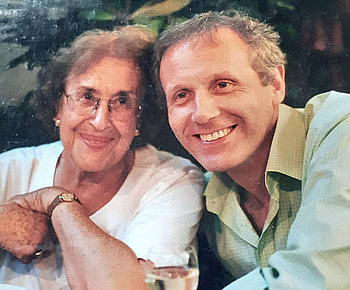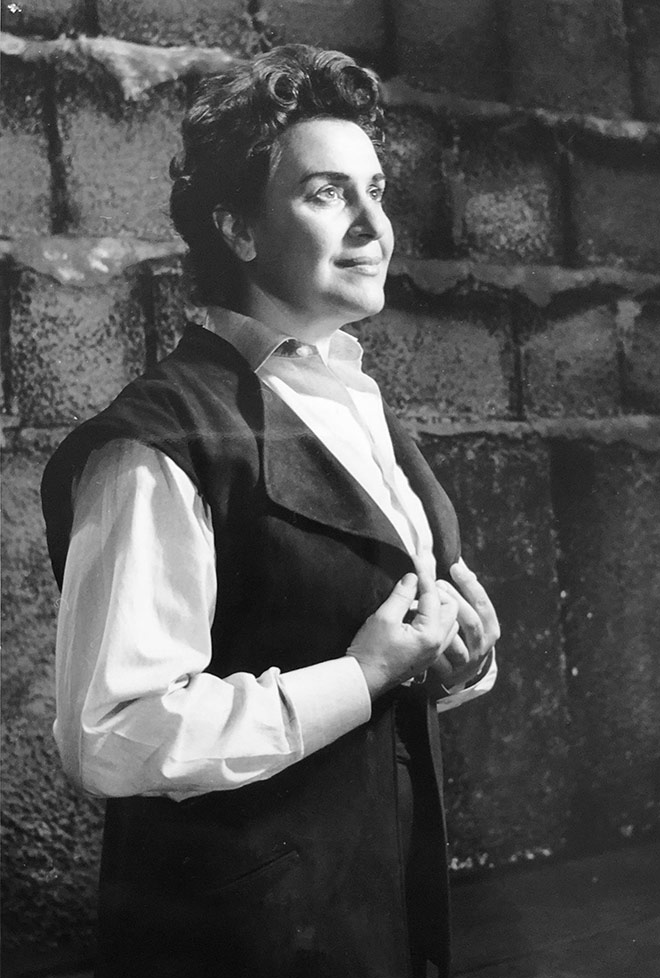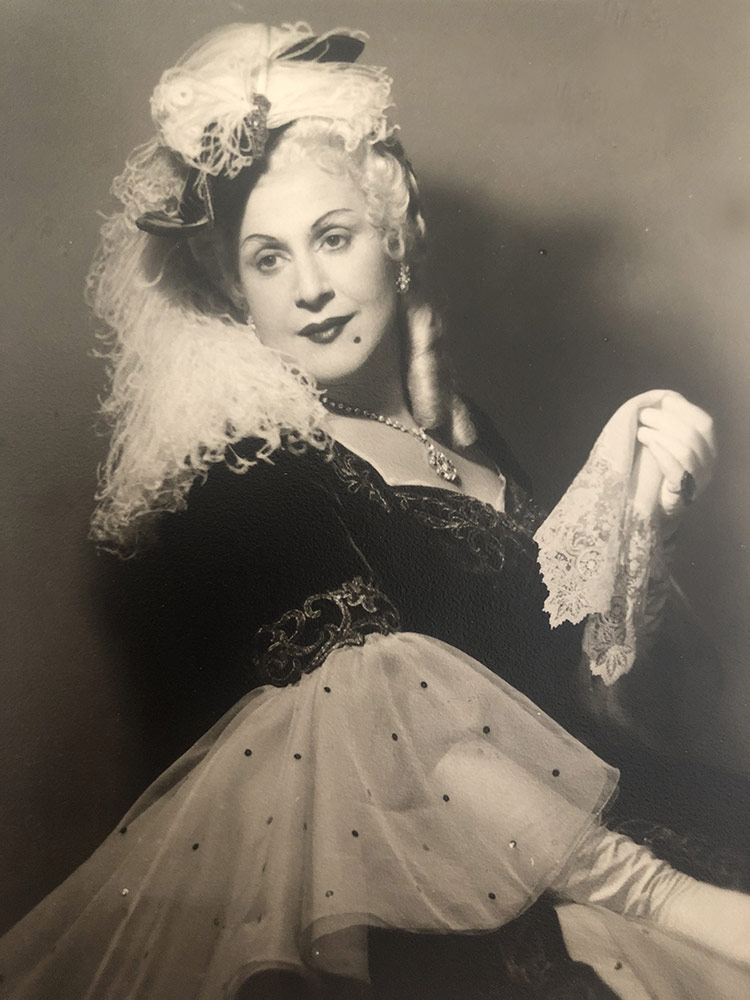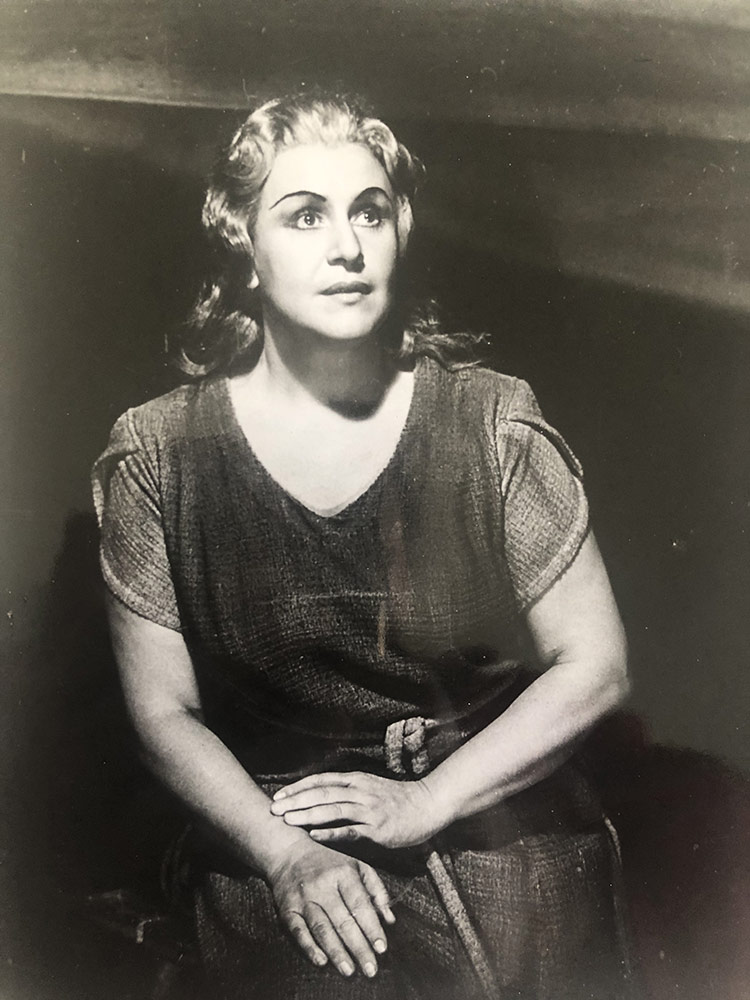HILDE ZADEK: ZUEIGNUNG / DEDICATION
Memories
By Charles Spencer
It was December 15th 1977 that our paths fatefully crossed.

Hilde Zadek was 60 years old on that day and although she was supposed to be teaching (I had been brought along to accompany) we were incessantly disturbed by the telephone, flowers being delivered, and well-wishers ringing the doorbell.
I had entered into, and became part of, an enchanted world where musicians, artists and intellectuals assembled. Evenings of discussions, intellectual and profane, became the highlights of my life, from which I departed with the deepest sense of gratitude and awareness of having been in the presence of greatness.
That Hilde Zadek was interested in, and supportive of, my talent has never ceased to amaze me and is a source of constant wonder. She was present at all my concerts in Vienna, from student beginnings to artistic fruition. Her smiling face and positive aura stood out in the audience, her positive attitude and critical insight leading to new interpretations and artistic development.
Our deep friendship of over 40 years based on mutual respect has been formative, fascinating and fulfilling; her humanity, a constant source of inspiration.
Inspiring also her self-criticism regarding her vocal and artistic achievements … she knew all too well her strengths and weaknesses and was far too honest not to learn from them.
For me, her recording of the Verdi Requiem (Salzburg Festival 1949) with Herbert von Karajan is a benchmark of how it should be sung. The pianissimo Bb in the Libera Me unsurpassed.
For every minute in her company I consider myself blessed. For being part of her inner circle (family), I am eternally grateful. As I write these words, I am haunted by the penultimate words of Hilde Zadeks' favourite recital encore: Zueignung by Richard Strauss (which she transposed up a semitone to achieve an extra frisson on the high Bb for the word Heilig/Holy!), which sum up my gratitude to this remarkable woman: Habe Dank!
Memories of Hilde Zadek
By Patrick Bade
The soprano Hilde Zadek was not only a great singer, but also a woman of remarkable courage and moral authority. I first met her at a dinner party given by the pianist Charles Spencer.

She was accompanied by her friend the soprano Maria Venuti, another very fine artist, whose singing reminded me of one of my best-loved sopranos, Elisabeth Schumann. I remember Maria Venuti smiling benignly at some of the intemperate and hilarious conversation around the table.
Hilde certainly had her formidable side. She did not, as they say, “suffer fools gladly”. Our host later informed me that she thought at first that I was a bit of an idiot. Happily, she changed her mind after I took her to the Tate Gallery for a tour of the British collection. After that we got on well and I greatly enjoyed listening to her perceptive opinions of other singers.
She belonged to an extraordinary generation of sopranos from the German-speaking world – Elisabeth Grümmer, Hilde Gueden, Sena Jurinac, Elisabeth Schwarzkopf and Irmgard Seefried, to mention only a few. She was generous and entirely objective in her assessment of her many rivals. When I enthused about the Salome of Ljuba Welitsch and asserted that she was born to sing the role, she corrected me, observing that, much as she admired Welitsch, she was very much a woman of the people and, off-stage at least, scarcely anyone’s idea of a Judean princess.
In 1997 I had recently begun working for the London Jewish Cultural Centre and suggested that Hilde be invited to give a talk. The idea was received with enthusiasm and Hilde agreed on condition that I interview her. She arrived in London a day or so before the interview and stayed with her pupil and protégée Adrianne Pieczonka at Barnes, just outside London. We all had a thoroughly good time in the evening: the food was delicious and the conversation funny. As I was about to leave, I realised to my horror that we’d done absolutely nothing to prepare for our interview. Hilde dismissed my anxieties and said, “Don’t worry. You can ask me anything you like, as long as it’s not why I never had babies!” Over the years I was to learn that this very question is of great interest to Jewish audiences and have been wrong-footed on many occasions when asked at the end of a lecture whether this or that artist had children. This was the first interview I’d ever conducted, and Hilde did me the disservice of making it all seem so natural and easy. I was soon to find out that this was not by any means the rule!
Right from the start Hilde had the capacity audience in the palm of her hand and generated an extraordinarily warm and happy atmosphere. Towards the end of the evening, this was momentarily threatened when a member of the audience asked a provocative question about Israel. I knew that under other circumstances Hilde, and indeed most of the North London Jews in the audience, would have been happy to debate the rights and wrongs of the Middle East conflict, but this was neither the time nor the place for that. Hilde dissipated this ugly moment with great aplomb. She said, “I am not here to talk about politics, but I will say just one thing. I long for the day when Arabs and Jews can live together as brothers”. She earned herself a standing ovation and the happy mood was restored.
Hilde was born into the Jewish middle-classes in Bromberg (now Bydgoszcz) shortly before it became part of the newly independent Polish state, but spent her childhood in Stettin, a city that remained German until 1945. Emigrating to Palestine in 1934, she supported herself with menial jobs while initiating her vocal training with the great dramatic soprano Rose Pauly. Hilde described Pauly as a “wild beast in anguish”, which meant she was perfectly cast as Elektra, the role in which she thrilled audiences around the world in the 1930s.
At the end of the war Hilde took the first opportunity to return to Europe and completed her training in Switzerland with a soprano of a very different stamp, Ria Ginster. At her best, Hilde Zadek could be said to have combined the visceral passion of Pauly with the vocal poise of Ginster. The raw passion can be heard in her marvellous recording of Chrysothemis’ lament, the poise in a near-perfect rendition of the Libera me from Verdi’s Requiem in a performance under Karajan at the 1949 Salzburg Festival.
In 1947 Hilde auditioned for the State Opera in Vienna, a city still under Allied occupation. Days later, she was thrown onto the stage as Aida without so much as a proper rehearsal. The result was a triumph, and she soon established herself as a favourite with the Viennese public. It was not long before she was awarded the coveted status of Kammersängerin.
I once asked her what it felt like to be a prominent Jew in post-war Vienna. She said that she never allowed the latent anti-Semitism of the Viennese to bother her. When she left the State Opera one evening after a performance, she found that someone had scratched the message “We do not want Sarah as Sieglinde” on the side of her car. She told me that she was proud to appear on stage as a Sieglinde who was tall, beautiful and Jewish!
Hilde Zadek died in Karlsruhe on 19 February 2019 at the age of 101. Sadly, life never brought us together again after that interview in 1997, though I was always kept informed of her comings and goings by Charles Spencer. I wish I had seen more of her. She was a life force and left an indelible impression.
Hilde Zadek –
Being and Singing
HOMMAGE
By Georg-Albrecht Eckle
Rarely does one find such a seamless confluence of destiny and voice, life and art. Whoever, like the author, had the privilege of experiencing Hilde Zadek perform, came away with more than an aggregate of music, stage and voice. Whatever role she embodied, Hilde Zadek imparted an enduring sense of music lived, of music come alive.
It all began with the fate of a Jewish girl from Bromberg, who fled to Palestine to escape the Nazis. To make ends meet, she threw her might and heart into working as a children’s nurse. She earned a place to study voice in Jerusalem, where the passion expressed in her singing was recognised and encouraged. After the war, she left for Switzerland, and through chance acquaintances in Zurich, she was heard and discovered by the Viennese opera director Salmhofer – a stroke of destiny.
She had the courage and greatness to become the first Jewish singer to perform in the land of past horrors and, in so doing, bring reconciliation. Overnight, she became famous: stepping in as ‘Aida’ at the Vienna State Opera, then joining its ensemble, as one of the pillars of its artistic rebirth. It was the start of a supremely poised career, and she would remain loyal to this house for the rest of her life, singing the great roles in her range with a distinct imprint – each reflecting a facet of her fate. In the same spirit, after retiring from the stage, she devoted herself to teaching: singing as an expression of life and humanity, far removed from any vainglorious artistry. The roles that carry her fame around the globe came to her by fate; and at the same time, they were her fate. Many are well-known roles, others are forgotten, but were no less true or ground-breaking in their own time.
The fateful role of Aida naturally came first: a role that is almost like a picture-book exaltation of the refugees’ plight. Zadek was identified with this role throughout her stage life, as well as with Leonore in Beethoven's ‘Fidelio.’ The Leonoras of the opera world reflected Hildegard's fate; she gave them her whole being and brought them uniquely to life. Whether it be the Leonore of ‘Fidelio’ or ‘Il Trovatore’ or 'La Forza del Destino': for decades, audiences would identify them instinctively with the person of Zadek.
They are all ‘damsels in distress,' women suffering anguish and inner turmoil, roles that adapt to her person; no need for her to resort to role-playing in order to portray them. A prime example is that other staple role in the life of Zadek: Puccini's Tosca.
It was always Hilde herself, with the fate that shaped her personality, that informed her musical style: letting the music suffuse the stage while she acted as medium. So formative was her fate that it empowered her to assume any guise without having to act the part. It is what distinguished her, musically and vocally, from other singers. Her voice had focus and strength, and tenderness, too, wielded with supreme confidence; her intonation was as unequivocal as her sense of life. The great conductors she worked with were enraptured: like Fritz Busch in Glyndebourne, at the beginning of her journey with Mozart and Verdi.
Hilde Zadek took life into her own hands and rejoiced in it, and for a hundred years, she gave that joy to others. She was the ‘marshallin of her destiny' and one of the few 'Rosenkavalier' Marschallins of her time who truly embodied the role – because she brought both detachment and humour to Strauss' music and knew how to realise allusive references, like the myth of Ariadne, in a reflective, unforced way: her Ariadne was just as much a loving woman as her poignant Chrysothemis. Hilde Zadek possessed that exalted degree of artistic awareness that cannot be defined with words, but only felt and heard: the understanding that the singing voice cannot be false, unless it is deliberately groomed to be so. This is what she learnt from her mentors, from Rose Pauly in Jerusalem and Ria Ginster in Zurich, and this is what the Zadek passed on to her own students: that you must sing with belief in yourself and your voice, because anything else is an insult to the truth.
It is a lesson with particular relevance for performing Wagner, a conundrum for Zadek, given her biography. She approached him objectively and brought a serene tolerance to his music, which had been so fatefully instrumentalised and politicised in the past. She was Elsa, Elisabeth, Evchen, often Senta, but above all an unforgettable Sieglinde, striking the ideal balance between femininity and heroism, expressing the courage to be a woman.
With all her might, she remained lyrical to the core. Like her Sieglinde, the Mozart role with which she is most closely identified is a courageous woman, Donna Anna, a role she would soon sing under Busch in Glyndebourne. But when called for, she could bring the same conviction and authenticity to the role of Elvira; for her voice possessed the depth from which to scale the heights for the whole tragic spectrum. She would perform Figaro’s elegiac Countess divested of all plaintive sentimentality; when she sang about loneliness, she knew what it meant. While the role she sang most often in her life was the First Lady in ‘The Magic Flute,' she was a magnificent Vitellia in 'Titus,' because she not only mastered the vocal artistry of belcanto but knew how to imbue it with meaning and personality, as in her recording with the memorable Joseph Keilberth, one of Zadek's most esteemed conductors. She was privileged to make music with all the greats of her time: with Fritz Busch, of course, and with Clemens Krauss, Erich Kleiber, Mitropoulos, Klemperer, but also Karajan, and not least Josef Krips, the uncompromising Mozart maestro of post-war Vienna.
All of the above are classical music roles. But Zadek was not only a highly individual proponent in the realm of good old opera; she also held her ear to the ground to detect the heartbeat of ground-breaking creativity, and some dazzling beacons for the future emerged in the process. No need for Zadek to reinvent herself to adapt to new roles and structures; wherever modern music expressed what it means to be truly human, there were roles destined for Hilde: as Magda Sorel in Menotti's 'The Consul,' for example, like a political version of her own own destiny; but also as Julie in Einem's 'Danton,' Eurydice in Orff's 'Antigone' or the Brangäne in Frank Martin Tristan's 'Le Vin herbé.' The extraordinary success that she achieved for Shostakovich's controversial ‘Lady Macbeth of the Mtsensk District’ in Vienna, through her radical identification with one woman’s fate in this unflinchingly truthful masterpiece of modernity, is the stuff of legend.
Nor did she shy away from the Second Viennese School, which she explored in concert rather than the opera stage: her exemplary realisation of Berg's Altenberg-Lieder set a benchmark that still stands. Altogether, although opera predominated in her career, she was equally in her element giving recitals and orchestral concerts, and from her early days in Jerusalem, she made a point of cultivating the classic German ‘Lieder,’ as well as lesser known compositions. Her duet evenings with her colleague Elisabeth Höngen were a special treat. Everywhere, even in operetta, a genre she espoused in a charming and strictly classical way, Hilde Zadek's singing projects the voice of humanity through a woman's mouth – as best expressed in the words of Fidelio: this voice, Hilde's voice, "penetrates the depths of the heart."





